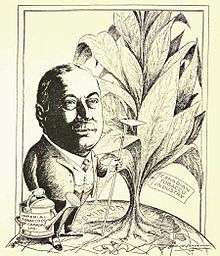Mortimer Davis
| Sir Mortimer Davis | |
|---|---|
 Historical photo of Mortimer Davis | |
| Born |
Mortimer Barnett Davis February 6, 1866 Montreal, Quebec |
| Died |
March 22, 1928 (aged 62) Cannes, France |
| Citizenship | Canada |
| Occupation | Businessman, philanthropist |
| Spouse(s) | Henriette Marie Meyer |
| Children | one son, Mortimer Davis, Jr. |
Sir Mortimer Barnett Davis (February 6, 1866 – March 22, 1928) was a Canadian businessman and philanthropist. The home he built in the Golden Square Mile has been renamed Purvis Hall and is today owned by McGill University.
Life and career
Born in Montreal, Quebec, to Samuel Davis and Minnie Falk Davis, he graduated from High School of Montreal and then joined his elder brothers Eugene Harmon and Maurice Edward in the family's cigar business, S. Davis and Sons. In 1888 S. Davis and Sons purchased another Montreal firm, D. Ritchie and Company. In 1895, the American Tobacco Company purchased D. Ritchie and Company, as well as the American Cigarette Company, another Montreal cigarette manufacturer. Samuel Davis retired from S. Davis and Sons, and Mortimer Barnett Davis left the family firm, which remained in the hands of two of his brothers, to become president of the American Tobacco Company of Canada.
In 1902, The British-American Tobacco Company Limited, jointly owned by the American Tobacco Company and the Imperial Tobacco Company of England. It later purchased the American Tobacco Company of Canada, which became the Imperial Tobacco Company of Canada Limited, and Mortimer Barnett Davis was its first president. The financial power of the empire over which he presided, earned him the title of "Tobacco King," which he shares with his great rival, Sir William Christopher Macdonald.

In 1917, he was knighted by King George V,[1] becoming the first Canadian-born Jew to receive such an honour.
Mortimer Davis was a member of the Montreal Board of Trade and the Montreal Stock Exchange as well as a director of many companies, including the Union Bank, Royal Bank of Canada, Henry Corby distillery (he served as president from 1907 to 1922), Crown Trust Company, Empire Tobacco and part of the senior management of the Nova Scotia Silver Cobalt Mining Company and the Consolidated Asbestos Mining Company.
Private life
On June 12, 1898, in San Francisco, he married Henriette Marie Meyer, daughter of Charles Meyer, a banker and philanthropist. Their only son, Mortimer Davis, junior, died in 1940.[2]
He was a member of Temple Emanu-El (see Temple Emanu-El-Beth Sholom (Westmount, Quebec)), which his father had helped to establish. He underwrote the entire $420,000 of a new YMHA (see Federation CJA) building, which opened at Mount Royal, near Park Avenue, shortly after his death. He was a key force in building the Mount Sinai Sanatarium,[3] in Préfontaine.
Sir Mortimer Davis spent much of the last years of his life at Les Glaïeuls, his villa in Cannes, where he died in 1928. He left 75% of his estate to be used for the construction of a Jewish public hospital that would bear his name. However, he stipulated that the funds be invested for 50 years to allow them to reach a sum capable of funding a sizable hospital.[4] And so it was that in 1978, $10 million from Davis's estate was donated to the existing Jewish General Hospital in Montreal. It was renamed the Sir Mortimer B. Davis Jewish General Hospital.
Lady Davis was an active philanthropist, and was made an officer of the Légion d'honneur and Commander of the Order of the British Empire.[2] She died in 1963. The Lady Davis Institute for Medical Research, the Lady Davis Fellowship, the Lady Davis Mechanical & Aeronautical Engineering Center, a 7-storey low-rise building of the Technion in Haifa, and the Lady Davis Building, main building of the National Library of Israel, in Jerusalem are named in her honour.
Mortimer Davis's Montreal residence in the Golden Square Mile (formerly Sir Mortimer B. Davis House) is now Purvis Hall,[5] on the grounds of McGill University.
He is interred within Mount Royal Cemetery.
References
- ↑ "London Gazette" (PDF).
- 1 2 "Obituary: Henriette Davis". Montreal Gazette. December 23, 1963. (page 4)
- ↑ http://www.ballyhoo.ca/worth/26-mt_sinai.shtml
- ↑ http://imjm.ca/location/1217
- ↑ http://cac.mcgill.ca/campus/buildings/Purvis_Hall.html
- "Mortimer Davis". Dictionary of Canadian Biography (online ed.). University of Toronto Press. 1979–2016.
- "Sir Mortimer B. Davis, Philanthropist". Retrieved January 23, 2006.
- "DAVIS, Sir MORTIMER BARNETT". Retrieved May 29, 2009.